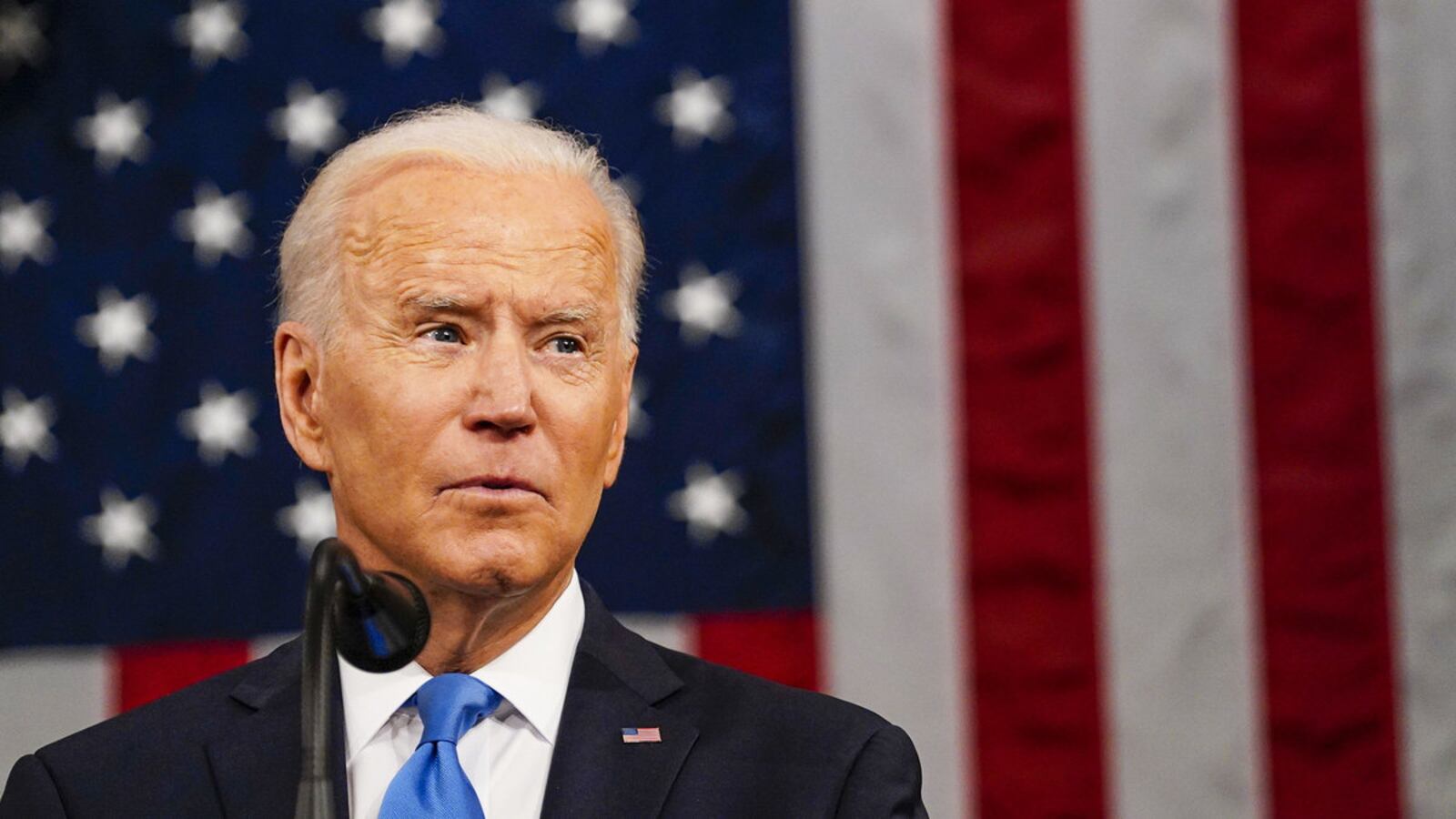Joe Biden once had a term for politicians who were too cautious to push for meaningful gun reform legislation: cowards.
“Why in God’s name can we say that we can’t do anything about 150,000 people being shot dead in the United States of America? Why are guns different?” Biden said during a campaign stop in Las Vegas in February 2020. “Because of cowardness. Because of cowards. Cowards who are afraid to take on these special interests because they are so damn powerful.”
In that address, delivered a few miles from the site of the deadliest mass shooting in American history, Biden promised to send a bill to Congress that would close background check loopholes and end liability protections for firearms manufacturers—on his first day in office.
“I promise you I will not rest until we beat these guys, because it is immoral what’s happening,” Biden said at the time. “I promise you, if I’m your next president they’re going to be held accountable, because I am coming after them.”
But 127 days—and at least 213 mass shootings, according to the Gun Violence Archive—into Biden’s presidency, his administration’s approach to firearm restrictions has not been nearly as expansive as he once promised. The long-promised legislation on background checks and liability reform still hasn’t been introduced, the national gun buyback program he once floated has been put on ice, and his first executive orders addressing guns weren’t issued until April, only coming after a series of high-profile mass shootings in South Carolina, Colorado, and Georgia.
On Wednesday, hours after a shooter at a rail yard in San Jose, California, killed eight people before taking his own life, White House deputy press secretary Karine Jean-Pierre said that the president was “calling on Congress to take action” on gun violence, reiterating similar remarks that press secretary Jen Psaki had delivered in the wake of previous mass shootings.
“What’s clear, as the president has said, is that we are suffering from an epidemic of gun violence in this country,” Jean-Pierre said, noting the smattering of executive actions issued by the president last month. Later on Wednesday, Biden issued a statement lamenting that, “yet again,” he was ordering the nation’s flag to be lowered to half-staff to mark a mass shooting.
And, “once again,” that he was calling on Congress to address the crisis.
“I urge Congress to take immediate action and heed the call of the American people, including the vast majority of gun owners, to help end this epidemic of gun violence in America,” Biden said. “Every life that is taken by a bullet pierces the soul of our nation. We can, and we must, do more.”
Gov. Gavin Newsom of California, however, didn’t hold back his anger at both sides in Washington for perpetuating a cycle of grief and indifference over gun violence.
“There’s a sameness to this and I think a numbness that we’re all feeling," Newsom said at a press briefing with local officials. “It begs the question—what the hell is going on in this country?”
Biden’s piecemeal approach to the issue reflects the limits of his power to address a problem that he has grappled with since his days in the U.S. Senate, gun control advocates say.
“Voters and Americans, by overwhelming margins, support many of these proposals,” said Adam Skaggs, chief counsel and policy director of the Giffords Law Center to Prevent Gun Violence. “It’s only divided in Congress.”
With a razor-thin Democratic majority and generally pro-gun Sen. Joe Manchin (D-WV) standing athwart any attempts at eliminating the filibuster, Biden’s ambitious agenda on gun control has, for now, been whittled down to the scale of his ability to enact it.
The most recent example is the Department of Justice’s proposed rule change that would update the definition of a firearm to include “unfinished” components sold in gun-making kits. Weapons built from those kits, which don’t have serial numbers and are increasingly popular among weapons traffickers, are known as “ghost guns” for the difficulty of tracing their ownership.
There are a smattering of gun-related bills that would accomplish much of Biden’s agenda on firearms. The Bipartisan Background Checks Act has passed the House of Representatives, and the Untraceable Firearms Act, introduced earlier this month by Sen. Richard Blumenthal (D-CT) in the Senate and Rep. David Cicilline (D-RI) in the House, would make proposed rule changes by the Department of Justice Department on “ghost guns” permanent.
But with Republicans largely hoping to block the nomination to lead the Bureau of Alcohol, Tobacco, Firearms and Explosives of gun-control advocate David Chipman—who appeared before the Senate Judiciary Committee only hours before the San Jose shooting—those legislative efforts are currently taking a backseat to Biden’s economic and pandemic-relief agenda. The result? Biden has been left with little more than executive orders and proposed regulatory changes at his immediate disposal.
That’s not to say that gun reform advocates are dissatisfied with what Biden has done so far.
“President Biden pledged last month to treat gun violence like an American epidemic,” said John Feinblatt, president of Everytown for Gun Safety, saying that the rule change was proof that Biden was keeping his word. “The Biden-Harris administration’s decision to regulate them like the deadly weapons they are will save countless lives.”
Gun-reform advocates are generally confident in Biden’s personal commitment to the cause, pointing to his successful passage of a federal ban on assault weapons in the 1990s and his close connections with the families of those killed by gun violence.
“We certainly don’t underestimate the challenges of moving legislation through the Senate, but we are pleased that the administration has been fairly clear in what it wants Congress to do,” Skaggs said, adding that the administration hasn’t “sat on their hands” while waiting for Congress to act. “They’ve sent a strong signal that they are going to do what they can, in terms of executive action.”
But whether Biden can navigate a divided Senate to pursue meaningful legislation on guns is another matter.
“We’ve not had anyone in the Oval Office who has spoken about gun violence as the public health epidemic it is, who has acknowledged the role of the executive in funding and in legislation, who has used the bully pulpit, and has had the emotional connection to survivors that he clearly has,” Kris Brown, president of Brady: United Against Gun Violence, told The Daily Beast. “But obviously, any executive action has a limited potential timeframe—another administration can come in and decide that they’re going to reverse the approach taken. It’s very important that whatever is done is then backed up with legislation.”
Biden knows better than most the risks of mishandling a high-visibility push for gun reform. In 2013, weeks after the murder of 20 young children and six adults at Sandy Hook Elementary School in Newtown, Connecticut, then-Vice President Biden was tasked by President Barack Obama to draft an expansive package of gun control measures. But Biden’s deliberative pace and focus on consensus-driven legislation was seen as a drag to the process, and the long legislative result of the efforts—a bill that would have extended background checks to gun shows and Internet sales of firearms—was defeated by the filibuster.
“The United States Senate let down an awful lot of people today, including those Newtown families,” Biden said bitterly after presiding over the bill’s defeat. “I don’t know how anybody who looked them in the eye could have voted the way they did.”
The lesson learned from that failure, advocates said, is a simple one: Don’t weaken your own legislation before you’ve even begun the fight.
“You don’t bargain against yourself… You don’t wait for consensus to emerge on an issue where history teaches it’s difficult, or just about impossible, to reach consensus,” Skaggs said. “The president, I think, learned from the past that these are challenging and difficult issues, but they are also issues that are too important not to fight for.”
But while gun reform advocates are understanding to a point, there are only so many times that background check legislation backed by a large majority of the American people can fall victim to the filibuster before they call for even more fundamental reform.
“We will not accept a vote on a bill that does not get us to a substantially better place with the system than we are now,” said Brown, whose organization shares a name with the Brady Bill, which mandated federal background checks for many firearm purchases, that Biden championed while in the Senate. If that comes to pass, she continued, “we believe the filibuster has to end.”
“As goes our issue, so goes [the For the People Act], so goes the John Lewis Voting Rights Act, so goes his entire agenda, effectively,” Brown said.
If that comes to pass, Biden will be forced to confront his own words on the urgency of gun reform, made in response to a shooting at a grocery store in Colorado in March.
“I don’t need to wait another minute, let alone an hour, to take commonsense steps that’ll save lives in the future,” Biden said. “And to urge my colleagues in the House and Senate to act.”







